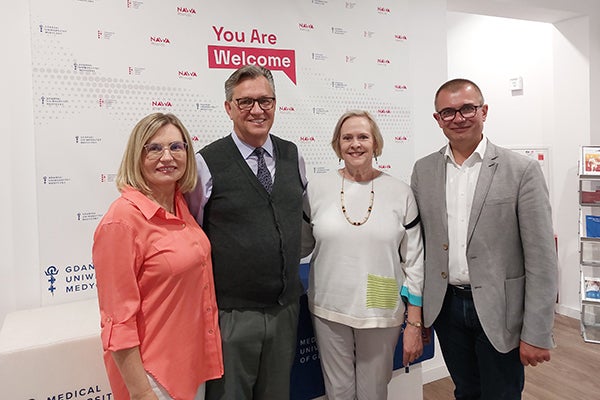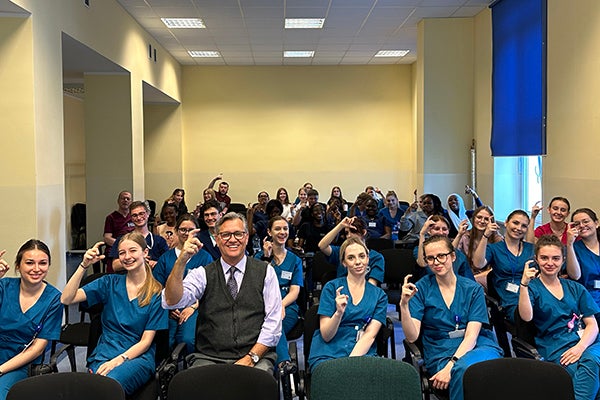ECU nursing faculty travel to Poland to lecture, explore student exchange opportunities
In the fall of 2022, Aleksandra Gaworska-Krzeminska, a nurse and faculty member from the Medical University of Gdańsk paid a long visit to her sister Ewa Silver, a marine archeology professor in East Carolina University’s history department.
During her visit, Gaworska-Krzeminska spent time in the simulation labs at ECU College of Nursing to learn about the state of the art education ECU provides in simulation-based learning to bring back to her institution in Poland.

Aleksandra Gaworska-Krzeminska, from left, a nursing professor at the Medical University of Gdańsk poses with East Carolina University nursing professors Mark Hand and Laura Gantt and Przemysław Rutkowski, dean of the Health Sciences faculty at Medical University of Gdańsk. (Contributed photos)
“The Medical University of Gdańsk is very research focused. During a conversation with her I asked whether they would consider hosting ECU students for a travel experience,” which was tentatively agreed to, said Laura Gantt, professor of nursing and associate dean for Nursing Support Services in the College of Nursing. “But it became apparent to me that a partnership wasn’t going anywhere unless I went and saw the place.”
The Medical University of Gdańsk had a grant to pay for several faculty members from international partner institutions to visit and for faculty and student enrichment activities, which would benefit the Americans and the Poles. Gantt asked Mark Hand, an ECU clinical professor of nursing, if he would join her on the trip to lecture Polish students on American nursing and also get an on-the-ground sense of what ECU students could expect if they participated in a study abroad experience in Gdańsk.
The hitch? The trip had to be scheduled for a few short months away, June 2023, with little wiggle room. The hastily arranged trip to a country neither Gantt nor Hand had visited was demanding, but on the bright side, all of the teaching done at the Medical University of Gdańsk is done in English. The English-based instruction made lecturing much easier for Gantt and Hand and they agreed it would benefit any ECU students who elected to study there.
During their visit, Gantt and Hand were able to work out the logistics for ECU student learners at the Medical University of Gdańsk – dorms would be available and there would likely be no issues with access to clinical settings for hands on training. The summer of 2024 will likely be the first opportunity for Pirate nursing students interested in a study abroad opportunity in Gdańsk. Gantt said they are looking to model the curriculum after a three-week program of study that Kim Larson has pioneered for her students in Guatemala.
“The course already exists and can be populated with objectives that suit the specific course and location. The objectives for our students would be the same regardless of the location of the experience,” Gantt said.
The main differences between U.S. and Polish nursing education, Gantt said, is that initial registered nurse training in Poland is wrapped up in three years and there isn’t a true equivalent for advanced practice registered nurses, a paradigm that has become a key part of the U.S. health care system.
“They don’t have a Ph.D for nurses; they have a masters level that signifies specialty training,” Gantt said. “The campus we were on is very physician-centric. The people we met at the university level who were Ph.D prepared were very knowledgeable, but the level of nursing is not the same as it is here.”

Mark Hand, an ECU clinical professor of nursing, teaches Polish nursing students how to give the Pirate hook during a lecture he gave at the Medical University of Gdańsk in June.
While the technical education might be different in Poland than in eastern North Carolina, Gantt and Hand agree that health care ultimately centers on the individual human being cared for. ECU nursing students getting first-hand experience with how that care is provided in different cultures will help deepen their appreciation of cross-cultural health care and bridge language barriers that occur at the bedside in the States and on the streets of a foreign city.
Gantt and Hand are also very open to the possibility of having Polish nursing students spend time at ECU, but the first steps of ECU nursing students in Poland need to be taken before expanding the partnership.
The first ECU students to participate in the exchange program would probably travel in the summer of 2024 and would pave the way for what Gantt and Hand see as the makings of a strong international partnership.
Bim Akintade, dean of the College of Nursing, is hopeful that a partnership with the Medical University of Gdańsk will result in learning and cultural enrichment experiences for ECU nursing students, due to increasing global interconnectedness and the rich diversity of patients who require care in rural North Carolina.
“The world is getting smaller by the day and nurses need to be confident and competent in finding ways to care for patients who are from different cultures,” Akintade said. “We have a strong history of immersing future Pirate Nurses in cultures different from the ones they were raised in and our partnership with our Polish colleagues will open the doors to even more hands-on learning at a world-class institution.”